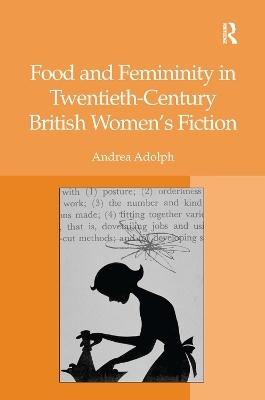
Food and Femininity in Twentieth-Century British Women's Fiction
Seiten
2009
Routledge (Verlag)
978-0-7546-6734-6 (ISBN)
Routledge (Verlag)
978-0-7546-6734-6 (ISBN)
An intervention into the ways in which British women novelists explore and challenge the limitations of the mind-body binary historically linked to constructions of femininity. It focuses on how women's relationships to food (cooking, eating, and serving) are used to locate women's embodiment within the everyday.
In her feminist intervention into the ways in which British women novelists explore and challenge the limitations of the mind-body binary historically linked to constructions of femininity, Andrea Adolph examines female characters in novels by Barbara Pym, Angela Carter, Helen Dunmore, Helen Fielding, and Rachel Cusk. Adolph focuses on how women's relationships to food (cooking, eating, serving) are used to locate women's embodiment within the everyday and also reveal the writers' commitment to portraying a unified female subject. For example, using food and food consumption as a lens highlights how women writers have used food as a trope that illustrates the interconnectedness of sex and gender with issues of sexuality, social class, and subjectivity-all aspects that fall along a continuum of experience in which the intellect and the physical body are mutually complicit. Historically grounded in representations of women in periodicals, housekeeping and cooking manuals, and health and beauty books, Adolph's theoretically informed study complicates our understanding of how women's social and cultural roles are intricately connected to issues of food and food consumption.
In her feminist intervention into the ways in which British women novelists explore and challenge the limitations of the mind-body binary historically linked to constructions of femininity, Andrea Adolph examines female characters in novels by Barbara Pym, Angela Carter, Helen Dunmore, Helen Fielding, and Rachel Cusk. Adolph focuses on how women's relationships to food (cooking, eating, serving) are used to locate women's embodiment within the everyday and also reveal the writers' commitment to portraying a unified female subject. For example, using food and food consumption as a lens highlights how women writers have used food as a trope that illustrates the interconnectedness of sex and gender with issues of sexuality, social class, and subjectivity-all aspects that fall along a continuum of experience in which the intellect and the physical body are mutually complicit. Historically grounded in representations of women in periodicals, housekeeping and cooking manuals, and health and beauty books, Adolph's theoretically informed study complicates our understanding of how women's social and cultural roles are intricately connected to issues of food and food consumption.
Andrea Adolph is associate professor of English and coordinator of service-learning at Kent State University-Stark Campus, USA.
Preface, Andrea Adolph; Long Division: Surpassing Mind/Body Duality, Andrea Adolph; Chapter 1 Regimentation of the Private: Hunting Down “Matter out of Place”, Andrea Adolph; Chapter 2 And the War Taketh Away: Female Embodiment and Sexual Excess in the Era of Austerity, Andrea Adolph; Chapter 3 Body as Text, Body in Text: Reader Response and the Consuming Body, Andrea Adolph; Chapter 4 Whole Numbers, Strange Remainders, Andrea Adolph;
| Erscheint lt. Verlag | 28.10.2009 |
|---|---|
| Verlagsort | London |
| Sprache | englisch |
| Maße | 156 x 234 mm |
| Gewicht | 453 g |
| Themenwelt | Geisteswissenschaften ► Geschichte ► Regional- / Ländergeschichte |
| Geisteswissenschaften ► Sprach- / Literaturwissenschaft ► Anglistik / Amerikanistik | |
| Geisteswissenschaften ► Sprach- / Literaturwissenschaft ► Literaturwissenschaft | |
| Studium ► 1. Studienabschnitt (Vorklinik) ► Med. Psychologie / Soziologie | |
| Sozialwissenschaften ► Soziologie ► Spezielle Soziologien | |
| ISBN-10 | 0-7546-6734-0 / 0754667340 |
| ISBN-13 | 978-0-7546-6734-6 / 9780754667346 |
| Zustand | Neuware |
| Informationen gemäß Produktsicherheitsverordnung (GPSR) | |
| Haben Sie eine Frage zum Produkt? |
Mehr entdecken
aus dem Bereich
aus dem Bereich


